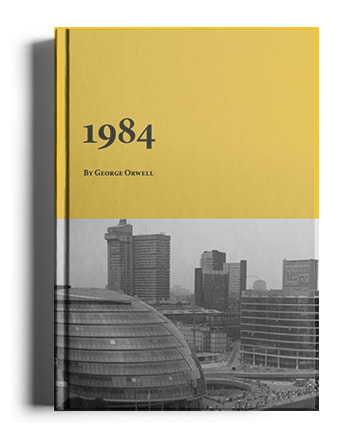1984 by George Orwell

1984 by George Orwell is a dystopian novel that portrays a terrifying vision of a totalitarian regime and its control over every aspect of individual life. The novel is set in a superstate called Oceania, one of the three great powers in the world, which is constantly at war with either Eastasia or Eurasia. The story takes place in the city of London, now the capital of Airstrip One (formerly Britain), which is part of Oceania.
The society in Oceania is governed by a political regime known as Ingsoc (English Socialism), led by the Party and its figurehead, Big Brother. Big Brother is an omnipresent, godlike leader who embodies the Party’s absolute control. Through constant surveillance, propaganda, and fear, the Party manipulates and controls every facet of life, including history, language, and even thought.
The protagonist, Winston Smith, is a low-ranking member of the Party who works at the Ministry of Truth, where his job is to falsify historical records to align them with the Party’s ever-changing narratives. Despite the oppressive environment, Winston grows increasingly disillusioned with the Party and begins to seek ways to rebel. He starts a secret love affair with Julia, a colleague who also harbors rebellious thoughts, though she is less interested in grand ideological resistance and more focused on personal pleasures.
As Winston delves deeper into forbidden thoughts and actions, he becomes obsessed with understanding the true nature of the Party’s power. He seeks out O’Brien, a high-ranking Party official who Winston believes is part of a secret resistance movement called “The Brotherhood.” However, O’Brien is not who he seems. In a devastating twist, Winston is arrested and tortured in the Ministry of Love, where O’Brien reveals that the Party’s ultimate goal is to maintain power for its own sake. The Party does not seek power to improve society but to perpetuate its own absolute control over the population.
The most haunting aspect of Winston’s journey is his eventual complete submission. After enduring severe physical and psychological torture, including the infamous “Room 101” where one is faced with their greatest fear, Winston betrays Julia and comes to accept and love Big Brother. The novel ends with Winston’s tragic capitulation, showing that the Party’s control over both the body and the mind is total and inescapable.
Themes:
1. Totalitarianism: Orwell’s novel is a critique of totalitarian regimes, particularly drawing parallels to Stalinist Russia and Nazi Germany. The government of Oceania controls not just the actions of its citizens but their very thoughts, illustrating the terrifying reach of such a regime.
2. Surveillance and Control: One of the key mechanisms of control in Oceania is constant surveillance. The Party monitors every aspect of a person’s life through “telescreens,” microphones, and informants. The fear of being watched keeps citizens in line, even when there is no one directly observing them.
3. Language as a Tool of Oppression: The invention of “Newspeak,” a language that reduces the range of thought, is a central element of the novel. By eliminating words that could be used for rebellion or critical thinking, the Party limits the ability of people to think independently.
4. Historical Revisionism: The Party continuously rewrites history to maintain its grip on power. The Ministry of Truth alters past records so that the Party appears infallible. This manipulation of truth reflects the dangers of propaganda and state-controlled media.
5. The Nature of Reality: Orwell explores the idea that if a government can control all information, it can dictate what is considered reality. The famous phrase “2 + 2 = 5” symbolizes the Party’s power to define truth, even if it contradicts basic logic.
6. Psychological Manipulation: Through intense psychological manipulation, the Party breaks down individual resistance. The use of torture and brainwashing forces Winston to not only conform outwardly but to internally accept the Party’s distorted version of reality.
Impact:
“1984” has become one of the most influential books of the 20th century. Its portrayal of a dystopian future where government surveillance, mind control, and propaganda are used to oppress the masses continues to resonate today. The novel introduced many concepts that have entered modern political discourse, such as “Big Brother,” “thoughtcrime,” “doublethink,” and “Newspeak.”
Orwell’s bleak vision serves as a warning against the dangers of totalitarianism, the erosion of truth, and the loss of individual freedom. Though written in 1948, many of the issues Orwell addresses—government surveillance, media manipulation, and the control of information—remain relevant, making “1984” a timeless reflection on power and the human condition.
1984
